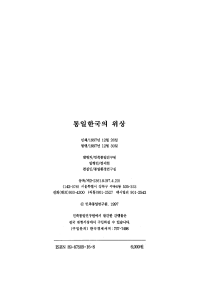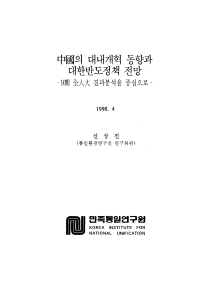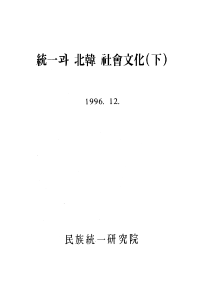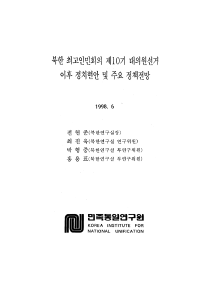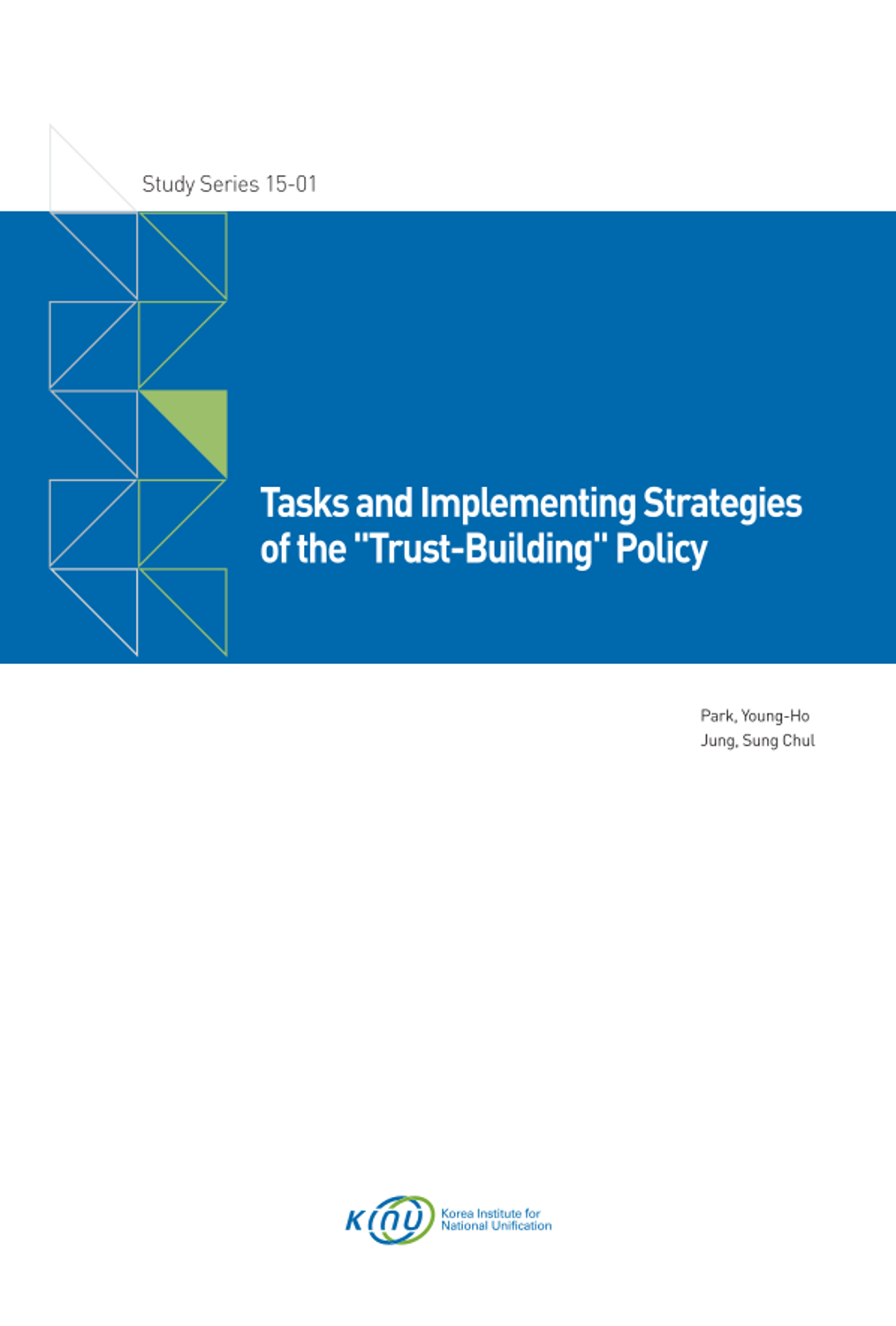
연구원발간물Study Series 2015-01
Tasks and Implementing Strategies of the "Trust-Building" Policy
- 발행사항
- Seoul : Korea Institute for National Unification, 2015
- 형태사항
- 76 p. ; 23cm
- 총서사항
- Study Series
- ISBN
- 9788984798038
- 청구기호
- 000 SS15-01
소장정보
| 위치 | 등록번호 | 청구기호 / 출력 | 상태 | 반납예정일 |
|---|---|---|---|---|
이용 가능 (2) | ||||
| 1자료실 | G0015701 | 대출가능 | - | |
| 1자료실 | G0015702 | 대출가능 | - | |
이용 가능 (2)
- 등록번호
- G0015701
- 상태/반납예정일
- 대출가능
- -
- 위치/청구기호(출력)
- 1자료실
- 등록번호
- G0015702
- 상태/반납예정일
- 대출가능
- -
- 위치/청구기호(출력)
- 1자료실
책 소개
“Laying the foundations for a peaceful unification” is one of the four administrative priorities of the Park Geun-hye administration.1)The three main strategies for implementing this policy are “watertight security,” “Trust-building Process on the Korean Peninsula,” and “trust-based diplomacy.”2) The watertight security is a strategy concerning national defense, while the trust-building process is a strategy for dealing with North Korea and unification matters. Lastly, the trust-based diplomacy is a strategy concerning foreign affairs.
Policy objectives can be efficiently realized only when these strategies concerning national defense, unification and foreign affairs have a mutual influence on each other and are interconnected. The common concept linking these three strategies is “trust.” President Park Geun-hye introduced the concept of a trust-based policy for the first time in August 2011 through an article published in Foreign Affairs.3) She suggested that the fundamental reason behind the collapse of genuine efforts by two Koreas to reconcile and the failure to break the vicious cycle of confrontation between the two is
due to lack of mutual trust.4) Arriving at the conclusion that lack of trust is the fundamental obstacle to inter-Korean relations demonstrates
that the Park administration intends to approach the problem not only based on principles, but also by addressing the very core of the issue.
Therefore, President Park has emphasized that “in order to transform the Korean Peninsula from a zone of conflict into a zone of trust, South Korea should adopt a policy that induces mutually binding expectations between two Koreas based on global norms.”5)Such was the philosophy behind the Trust-building Process on the Korean Peninsula, an initiative for North Korea and unification policies designed to implement the Park administration’s goal of
“laying the foundations for a peaceful unification.” The following three were set as the policy objectives: (a) a development of inter-Korean
relations, (b) a peace establishment on the Korean Peninsula, and (c)the laying of the groundwork for a peaceful unification. These goals are to be attained by promoting a balanced approach, formulating North Korea policies that are constantly evolving, and cooperating with the international community.6) Here, the concept of trust embodies the relationship between two Koreas not only on a bilateral level, but also on national and international levels. In other words, trust is “the very foundation that enables the advancement in inter-Korean ties, the establishment of lasting peace on the Korean peninsula and the laying of the groundwork for a unified Korea. At the same time, it serves as social capital and infrastructure that empower us to push forward our North Korea and diplomatic policies with popular support of the Korean people and through international cooperation.”7)The July 4 Joint Communiqu?, which is the first document agreed upon by South and North Koreas, states the “Three Principles for
Unification” along with agreements to ease tensions, foster an atmosphere of mutual trust and not to slander or defame each other. Since the time
the South Korean government proposed that the South and the North pursue an open door policy as to fulfill one of the “Three Principles of
Peaceful Unification,” which was declared on August 15, 1974 by the then President Park Chung-hee; and that they proceed with a sincere
inter-Korean dialogue and realize multilateral exchange and cooperation in order to recover mutual trust, the importance of trust-building has
never been overlooked in the process of South Korea implementing North Korea policies.8) Trust is often described as a philosophical concept not only concerning policies on North Korea or unification, but also encompassing an entire range of state affairs, including national defense, unification, and diplomacy.9)However, inter-Korean relations have experienced numerous ups and downs for a long time, and despite efforts put into improving
bilateral relations, establishing peace and laying the foundations for unification, the relations did not make as much progress as expected.
Besides, North Korean nuclear issue has emerged as a dominant agenda in inter-Korean relations since the early 1990s. In fact, there are many specific tasks that need to be carried out in order to advance inter-Korean relations, establish peace in the Korean Peninsula and lay the foundations for unification. Over the past few years, progress in inter-Korean relations has stalled and North Korean nuclear issue, the resolution to which is imperative to establish peace on the Peninsula, have in fact worsened. Furthermore, much effort is needed to expand domestic and international capacity to establish the foundations for unification.
As it is evident from the results of the last 40 years of inter-Korean dialogue and contact as well as the current state of affairs, it is difficult
to assess the outcomes of policies on North Korea and unification on a short-term basis. We know by experience that often inter-Korean relations suffer a setback after some progress has been made. In addition, objectives of North Korea and unification policies cannot be easily achieved in the short term. From 1970 to 2014, there were approximately 640 cases of inter-Korean contacts and dialogues.10)Nevertheless, the fundamental nature of military confrontation has remained unchanged. Despite sporadic cases of reconciliation and cooperation, structural conflict and hostility still persist. To date,
North Korea has responded negatively to South Korea’s policies such as the “Dresden Initiative,” not to mention the trust-building process.
After Kim Jong-il’s death in December 2011, a third-generation succession took place in which Kim Jong-un ascended to leadership in a monolithic leadership system. Since forth, the development of “nuclear weapons and missile”―the legacy of the Kim Jong-il regime - has become both an official core strategy and a means of national defense. Kim Jong-un stipulated North Korea as a “nuclear-weapons state” in the DPRK Constitution and adopted a “byungjin line of nuclear development and economic construction (a policy pursuing the development of both nuclear weapons and economy at the same time)” as a strategy for national development, more aggressively strengthening North Korea’s nuclear deterrence.
Meanwhile, Northeast Asia has been witnessing the relative decline of the United States, once the only superpower, and China expressing assertive foreign and defense strategies based on its rapidly growing economic might. The region that is most sensitive to changes in Sino-U.S. power dynamics is the Korean Peninsula. Furthermore, disputes between China and Japan and between South Korea and Japan over territory and history have further affected the environment surrounding South Korea’s policies on North Korea and unification.
Issues on the Korean Peninsula are becoming more internationalized, and bilateral and multilateral relations among Northeast Asian states have become very complex. There is no evidence that the Kim Jong-un regime’s aggressive policy on South Korea has shifted, and the debate on the actual stability of the regime is still ongoing. In addition, there are many problems in South Korea’s economic, political and social capacity to normalize inter-Korean relations and lay the foundations for a peaceful unification.
Under such circumstances, there will be numerous obstacles to materializing sustainable peace in the Korean Peninsula through a new paradigm for North Korea and unification policies, and to implementing strategies to realize a “new Peninsula” that would yield a happy unification by laying the foundations for a peaceful unification. In order to develop inter-Korean relations and create a strong foundation for unification, policies on North Korea and unification must be promoted based on long-term strategies for national development.
Meanwhile, to normalize inter-Korean relations, denuclearize North Korea, establish peace on the Peninsula and lay the foundations for unification, the Park administration’s policy on North Korea and unification, which is presented as the “Trust-building Process,” must be implemented and executed in earnest. Moreover, the trust-building process must develop into a sustainable policy that transcends limitations of time, space, and the surrounding environment. According to the Ministry of Unification, the trust-building process is a “new approach”that seeks to comprehensively undertake North Korean issues by adopting the benefits of past policies on North Korea.11) In order for this “new approach” to yield successful results and emerge as a sustainable North Korea and unification policy, it will need to be consistently improved and developed. The trust-building process proposes “an evolving North Korea policy” as one of its principles for carrying out policies. According to a national survey on what should be the Park administration’s priorities for the forthcoming tasks, a majority of people think that a “formulation of a unification policy that is sustainable regardless of changes in administration” is the most imminent task concerning unification.12) Among the many factors that affected German unification, a consistent application of Ostpolitik irrespective of changes in administration, that is, alterations in its political inclination between the left (SPD) and the right (CDU), is thought to have had a very significant impact.13) In consideration of these problems, the objectives of this research are to present specific tasks and implementation strategies to accomplish core tasks of North Korea and unification policies, such as the normalization of inter-Korean relations, North Korea’s denuclearization, and the establishment of peace on the Peninsula, and the laying of the foundation for unification. This research also seeks to present an “integrated approach” that will make it possible to carry out the aforementioned tasks in a comprehensive, multi-faceted and concurrent manner. The term “trust-building policy” used here refers to North Korea and unification policies that aim to normalize inter-Korean relations, denuclearize North Korea, establish peace in the Korean Peninsula and lay the groundwork for unification by building trust between the two Koreas and at national and international levels based on the understanding of the trust-building process, the core concept of which is “trust.”14) In the process of implementing policies on North Korea and unification, trust should bring about an accumulation of inter-Korean trust and incorporate a “domestic trust-building process” that would alleviate “South-South conflict (social conflict within South Korea)” and broaden policy consensus. It should also encompass an “international trust-building process” whereby South Korea’s policy earns the trust of the international community.15) The
importance of trust building has been emphasized throughout the policies on North Korea and unification formulated by past administrations.
In many ways, the agreements on reconciliation, non-aggression, and exchange and cooperation set forth in the Joint Communiqu? are ultimately processes in which inter-Korean trust is built and are tasks that can be achieved through accumulated trust. Therefore, the “trust-building policy” presented in this research is meaningful in a sense that it can serve as a sustainable and continuous policy on North Korea even after the changes in governments in the future.
목차
1. Research Objectives
2. Methodology and Scope
3. Policy Tasks and Implementation Strategies
A. Implementation Strategies for Normalization of Inter-Korean Relations
B. Implementation Strategy for Denuclearization
C. Implementation Strategy for Establishing Peace on the Peninsula
D. Strategy for Laying the Foundation for Unification
4. Conclusion


